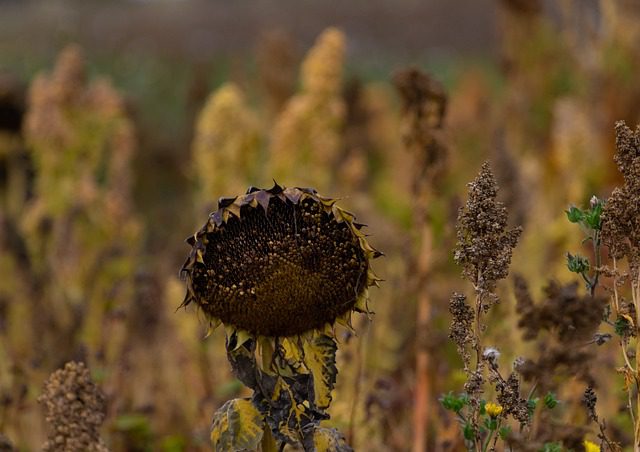
On a chilly mid-November afternoon, I went outside to turn over the compost heap.
I had only a little time before I had to get Adrienne from middle school, but I needed to do my gardening. It’s the only thing that makes me feel grounded and alive. I have to make busywork for myself outdoors, even in November when the world is dying all around me, and in winter when it’s dead.
As I rounded the corner to the backyard, I saw the yellow petals.
The Artful Dodgers had torn the blossoms off my last sunflower.
I forgot all about turning that compost.
It wasn’t much of a sunflower: just a reed with three ragged blooms the size of a silver dollar. But I was keeping it alive to see how long it lasted. Now the flowers were ripped off and tossed around the garden patch. No animal would pluck off a flower without tearing down the stem, and without eating them. This was a human vandal. And I knew it must be the same one who stole the last tomato I was ripening in September, and who kept swiping pumpkins, and who always played in Adrienne’s old sandbox and left the lid off so the neighborhood cats used it for a latrine. Those children just like to pick at things.
I like the Artful Dodgers, just as I like Jimmy’s Boy and the other neighborhood children. I look forward to their visits. I would like to keep letting them cut between my house and the Haunted House to catch the school bus in the mornings. But I don’t know what to do about the thefts. I’m determined to grow a bigger garden and feed the neighbors next summer, and that means they’ll have to learn to ask before they take.
How will I protect my garden? Fence it off with “Keep Out” signs? That seems cruel. I don’t want to be cruel. I want to share.
I’d be lonelier than ever if the neighborhood children thought they weren’t welcome to visit and ask questions about the garden. I ‘d be heartbroken if I drove them off. But I can’t let them destroy it either.
I sat on the steps, catching my breath. The air was warm where the sun fell, but there was a hint of chill in the shadow. We’ll have a hard frost before long.
For the thousandth time, I imagined that fantasy that’s farther away from me now than ever: that I could somehow have enough money to buy the house I live in from the landlord, and buy the Haunted House from the old neighbor’s estate, and buy the house of the cross grumpy neighbors on the west side of the Haunted House, and have an urban farm, and be happy.
Things being the way they are, of course, I now know I won’t get the planned student debt forgiveness so I could ever pay a mortgage on one house. I won’t get the tantalizing repayment program with the lower payments. The price of everyday necessities will skyrocket once the tariffs start. And I won’t be getting that mortgage assistance that was being discussed in stump speeches either. Nobody will. That’s an America that didn’t come to be.
But in my imagination, I was rich. I fixed up this house to be pretty and comfortable, and bulldozed the other two. I put in a postage stamp orchard with the tart green apples Adrienne loves overtop of the place where the Haunted House used to be. I put in a little koi pond and a coop for Asian runner ducks on the foundation of the cross neighbors’ house. I expanded the vegetable patch, planted a blackberry bramble, and trellised grapes on the Haunted House’s garage. I had a pump for water so I didn’t have to borrow the hose from the kind neighbors anymore. I could show off beautiful flowers, and feed so many people with my hard work. Even my grandfather would be proud of that garden.
And then I did even better than imagining myself rich. I imagined myself good.
I imagined myself a Shaker, for some reason. When I was in undergraduate in Westerville, before my whole life went wrong, I had a professor who showed us a video documentary on the Shakers, and I fell in love with their aesthetic. I wanted to go out to my imaginary farm in a plain, modest dress with that odd sharp triangle bib and a tight white cap, and plant a separate garden for the deer and the groundhogs and the neighborhood urchins to eat out of, so that I could be in harmony with nature and everyone could have enough. Without fences, without conflict, without ever having to tell anybody “no.”
I’m sure I would make a terrible Shaker. I’m a bad enough Catholic; an even higher control religion would be the death of me. But I’d like to have a go at living and farming and following rules in a peaceable community of fellow believers with a precept for every action and every hour of the day. Living with people who felt obligated to tolerate me for charity’s sake. Having a clean, minimalist house and furniture with convenient functional cupboards and hooks everywhere. Not only being allowed to stim during worship but having choreographed stims required of me during the hymns.
O Brethren ain’t ya happy, O Brethren ain’t ya happy! O Brethren ain’t ya happy, follower of the Lamb!
Then sing well and dance well, ye followers of Emmanuel! Then sing well and dance well, ye followers of the Lamb!
O Sister ain’t ya happy, O sister ain’t ya happy? O Sister ain’t ya happy, follower of the Lamb!
Then sing well and dance well, ye followers of Emmanuel! Then sing well and dance well, ye followers of the Lamb!
I’m glad to be a Shaker, a Shaker, a Shaker, I’m glad to be a Shaker, follower of the Lamb!
Then sing well and dance well, ye followers of Emmanuel! Then sing well and dance well, ye followers of the Lamb!
I’ll cross my ugly nature, my nature, my nature! I’ll cross my ugly nature, follower of the Lamb!
Then sing well and dance well, ye followers of Emmanuel! Then sing well and dance well, ye followers of the lamb!
It would be like being a nun, but more kinetic.
As it is, I am nothing that I ought to be, and I certainly haven’t crossed my ugly nature.
I am a fat, lonely, chronically ill forty-year-old woman, in a tumbledown rental house in a bad neighborhood, in a dying republic, on a planet burning to death. And I don’t even have any sunflowers.
The November breeze tormented me, so I got up.
I went to get the keys to Sacre Bleu, and get Adrienne home.
A short time ago, I really was happy, and I felt like I could stay happy.
One day I may be happy again, but it’s cold now.
Mary Pezzulo is the author of Meditations on the Way of the Cross, The Sorrows and Joys of Mary, and Stumbling into Grace: How We Meet God in Tiny Works of Mercy.














